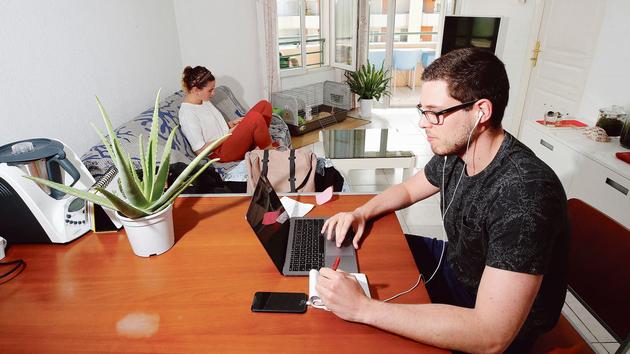After eight weeks at home and when the time has come for deconfinement, when are we going to meet our colleagues? Maybe not before the start of the new school year in September, if the government believes it. From ministers to social partners, via transport operators, calls have followed one another in recent days so that the five million employees currently in telework remain so beyond this Monday, the date chosen for progressive deconfinement. By presenting his plan on Tuesday, Prime Minister Édouard Philippe had asked all companies that could afford to maintain this system "at least in the next three weeks" . Labor Minister Muriel Pénicaud considers "reasonable"to affirm that telework will remain massive until the summer. That's good, according to a survey by Malakoff Humanis *, 73% of employees want it continued.
Read also: Julia de Funès: "Telework must remain a freedom"
In Île-de-France, there is a great fear of travelers flocking on public transport, normally used by five million users every day. The president of the region, Valérie Pécresse, asked that the employees today in telework do not return to the office on Monday. "Anyone who can stay in telework, be nice, stay there!" "Launched Medef Paris president Charles Znaty. Some business leaders also say they are worried about seeing their civil and criminal liability engaged, when an employee claims to have contracted the Covid-19 at their workplace.
Family tensions appeared in 28% of households. Muriel Pénicaud also called on employers to show kindnessBefore the crisis - and before the strikes of December 2019 - only 7% of French employees practiced telework on a contractual basis. According to the CSA study for Malakoff Humanis, 39% of employees in companies with more than 10 people are teleworking at the moment. Half of them experience this organization for the first time. Who are these teleworkers in containment? Rather men (56%), exercising 92% of their activity from their main residence (including 54% in a house and 46% in an apartment). 46% live in a couple with child (ren). They are mainly employed in the service sector, and in a company with more than 250 employees.
Confined to the home, professional and private spheres often collide. At Laurence and Jean, both executives in a large company, the program for the day is developed from breakfast: "I have a whole series of important calls: leave me alone this morning," begs the first. “Me, my conf call is at 3.30 pm; don't go online at the time! ” , recalls the second. While the eldest son must "take his online course from noon to 2 pm, so will have lunch later", and the younger daughter "will wait until evening to watch Netflix" ... Not always easy! Family tensions appeared in 28% of households. Muriel Pénicaud also called on employers to show kindness: "You can't work the same way with two children at home, " she underlines. But, between not working and working anyway , the second option is preferable for the economy.
"Needs for change"
“One of the surprises of the survey is the satisfaction rating among new teleworkers: 7.6 out of 10, specifies Anne-Sophie Godon, director of innovation at Malakoff Humanis. A good note, when neither they nor their company really had the time to organize, and especially in the context that we know: concern for the future, presence of children or dependent parents… ” If 30% of confined teleworkers believe that their psychological health has deteriorated, 38% of respondents think that this situation has a positive impact on their autonomy, their empowerment, their time management and their concentration.
Hence the strong demand from teleworkers: 73% of them (88% of regulars and 58% of new ones) wish to ask to continue after confinement, on a regular basis (for 32%) or more punctually (41%). "For employees and business leaders alike, this period will create expectations and needs for change," analyzes Anne-Sophie Godon. Reorganize work spaces, the use of digital tools, transversality, rituals… I already see many leaders who are thinking about what they want to keep from this experience. ”
* Carried out in April with a representative sample of 1010 employees of private sector companies with at least 10 employees.
"Remove pressure"
At Verizon Media, a tech company, the culture of telework has been ingrained for a long time. Communication tools are adapted to this and managers used to managing teams remotely. However, the company quickly had to change its practices. “The limit is not in teleworking per se, but in working at home in times of crisis. Spending your days on call in your room is not normal. That an employee does a videoconference with his child on his lap should not be a problem. I put everyone at ease to remove any pressure ” , points Erik-Marie Bion, vice-president France and Germany. But, in front of the engagement without counting of the employees, he asked for a self-discipline so that each one is cleaned. "You have to beware of the French" ça va ", where you kick in without spilling out."
"Complicated and exhausting"
At Theodo, a specialist in the development of web and mobile applications, which has 130 employees, the brutal implementation of telework “was complicated and trying. To move forward effectively, we need to see each other, ” says CEO Julien Laure. The company uses a lot of physical media to communicate, with Post-it notes everywhere, and a wall on which employees constantly write. With containment, the processes were digitalized, but employees had connection problems. As for videoconferencing, “chaining them together is exhausting. We are in constant tension, to make sure that the message has been understood ” .

